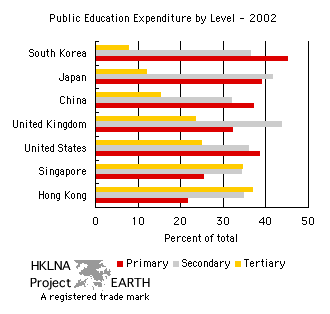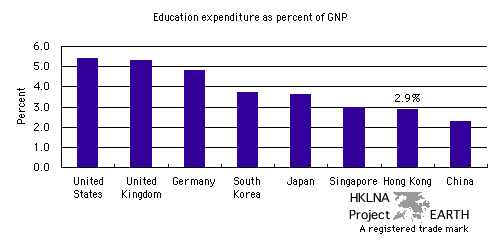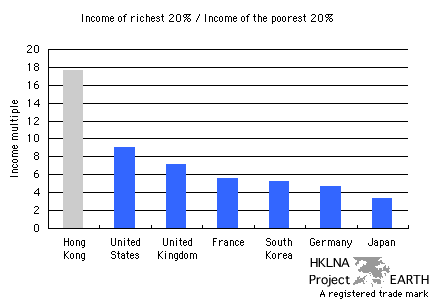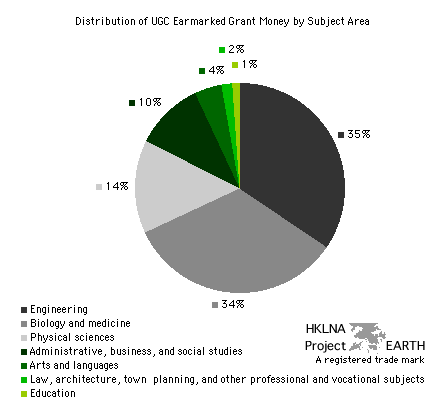After the graphs are downloaded onto your hard disk, adjust the width of your screen until you obtain an aesthetically pleasing arrangement of text and images. Clicking on the graphs will open your browser to the corresponding tables and data sources from which the graphs were constructed.
Educational reform is not so much about the children of today's entrepreneurial, governmental, and familial elite, as it is about the social fabric from which these and other children will someday weave and mold the future of Hong Kong into a sustainable, prosperous, world community. By the time a child has graduated from school his system of values, social behavior, and conceptual understanding of the world about him are firmly in place. How he relates to his peers, his ability to submit to authority, the way in which he goes about solving problems, and his ability to express himself are unlikely to change dramatically thereafter.
Hong Kong's Inverted Educational Pyramid
In the bar chart to the right the distribution of public expenditure on education across levels is provided for Hong Kong and its principal trade partners, as well as Singapore. Each country is ranked according to the amount spent on tertiary education.
 Hong
Kong is at the bottom of the list because, as a proportion of public
expenditure on tertiary education, it spends the greatest amount. A
close examination of primary education expenditure across Hong Kong's
trade partners reveals, however, a rank order that is nearly identically
opposed. This contrast is crucial in understanding what is wrong with
Hong Kong's current system of education, and why Hong Kong's future
social fabric is seriously endangered.
Hong
Kong is at the bottom of the list because, as a proportion of public
expenditure on tertiary education, it spends the greatest amount. A
close examination of primary education expenditure across Hong Kong's
trade partners reveals, however, a rank order that is nearly identically
opposed. This contrast is crucial in understanding what is wrong with
Hong Kong's current system of education, and why Hong Kong's future
social fabric is seriously endangered.Although Hong Kong is rather average with regard to the proportion of public money that it spends on secondary education; like Singapore, it demonstrates an overall inverted pattern of expenditure on education.
It is one thing to spend more money per student at the tertiary level, it is quite another to neglect the primary level altogether! It is also very questionable how much of the money spent at the tertiary level actually goes into the education of Hong Kong's future leaders.
Government Expenditure on Education
The regional government is quick to indicate the large portion of Hong Kong tax dollars spent on the education of Hong Kong's children, but as a proportion of the total economy just how much is truly spent? Compare Hong Kong's expenditure with that of its principal trade partners in the chart below. One may argue that Western nations, whose social fabric tends to be far looser than that of East Asian nations, require greater expenditure on education at all levels. On the other hand, Japan and South Korea enjoy much more tightly knit societies than their Western counterparts.

There is a point where even the strong family ties of Chinese tradition can no longer hold up against the social stress and alienation associated with highly competitive markets and globalization.
In its January brochure entitled Education Statistics the Education and Manpower Bureau proudly showed a rising trend in public money spent on education. Unfortunately the overall rise is increasing at an ever decreasing rate. The story does not end here, however.
Enormous and Increasing Income Disparity
In 2001 Hong Kong's top 20% earned nearly 20 times what its bottom 20% earned for approximately equal amounts of time spent at work. This discrepancy worsens for the top and bottom 10%.
Though this polarization of knowledge and wealth was probably well-suited for an ancient agrarian state and colonial empire, it is hardly appropriate for a modern, quasi city-state that depends as much on the initiative, industry, and intelligence of its middle-managers and common work force, as it does on its well-established families and entrepreneurial elite.
 In
an age of instantaneous telecommunication and increasing access to the
internet the potential foreveryone to access the same information
is rapidly increasing. Without proper education and appropriate
incentives, however, this productive potential can never be properly
tapped.
In
an age of instantaneous telecommunication and increasing access to the
internet the potential foreveryone to access the same information
is rapidly increasing. Without proper education and appropriate
incentives, however, this productive potential can never be properly
tapped.In Hong Kong not only are the knowledge and monetary incentives distorted, but the distortion is becoming worse. The GINI coefficient is a measure of the income inequity of a society. According to Hong Kong's Census and Statistics Department Hong Kong's GINI coefficents for 1991, 1996, and 2001 were 47.6, 51.8, and 52.5, respectively. A low GINI coefficient means better equality.
Educational Reform
So, what is the Hong Kong regional government doing to improve things? Consider, for example, the distribution of UGC earmarked grant money -- namely, public money set aside by government to promote training and research in specially designated areas of scientific inquiry.
 Only 1% of all earmarked grant money goes to education.
Is it necesary to point out that increasingly advanced technology in the
hands of a few is more than just an invitation for political
oppression; it is a recipe for economic suicide. What about the
environment?
Only 1% of all earmarked grant money goes to education.
Is it necesary to point out that increasingly advanced technology in the
hands of a few is more than just an invitation for political
oppression; it is a recipe for economic suicide. What about the
environment?Hong Kong residents work hard, but how many of them actually have the time, incentive, means, and opportunity to take advantage of the knowledge that is now, not yet so freely, available to everyone?
Social Capital
What attracts our attention in the morning paper is not the presence of social capital, rather its all too obvious absence -- labor accidents, labor strikes, the unemployment rate, environmental destruction, drug busts, white collar crime, the suicide of prominent social figures and young teens, murders, and government scandals.
Though Hong Kong's crime rates are still low compared with those of its major Western trade partners, Hong Kong generally ranks the highest among its principal East Asian partners. The extreme inequity with which knowledge and wealth are distributed in Hong Kong is likely a significant contributing factor.
With the exception of Singapore, which has even more police personnel per citizen than Hong Kong, Hong Kong towers over its Western and other East Asian principal trade partners by a multiple of two. If this is what makes Hong Kong a safe and productive place to live and work and attracts capital from abroad, then perhaps we should reconsider. A large police force can protect the wealth of those who have accumulated it, but it cannot provide the skills, values, and industry necessary to produce it.
According to the most recent report of the Hong Kong Commission on Strategic Development, Hong Kong's leadership wants Hong Kong to remain a first-class world city. How it will achieve this, one can only wonder, if the issues brought forward in this brief report and on the HKLNA-Project's website remain ignored. By way of example, when EARTH offered to present a formal paper on the economics of Hong Kong's English language industry before the Hong Kong Economics Association's 2nd Biennial Conference, it was accepted and then later rejected. Why? Insufficient interest in the economics of education.
EARTH
By now you may be asking yourself what any of this has to do with English language reform. Certainly the way English is taught, employed, and understood in Hong Kong is much more a symptom of the problem than its cause. Nevertheless, if English language reform is conducted properly, it will not only provide a better basis for international communication, but also redirect some of Hong Kong's already meager tax dollars into other areas of education with much greater need
Hong Kong's Chief Executive clearly stated in the opening remarks of the Commission on Strategic Development's report Bringing the Vision to Lifethat civic groups are welcome in Hong Kong. The HKLNA-Project Fund can be just such a group, but its success depends on your support. Please visit EARTH's fledgling website and see the voluntary effort that has already been put into making Hong Kong a world city of the future. EARTH is looking forward to hear from you.
Sincerely,
R. A. Stegemann
Owner and Manager
hsmr@pacific.net.hk
East Asian Research and Translation in Hong Kong
https://www.hashimori.com/moogoonghwa/earth/index.htm

Click on the HKLNA-Project's Logo for a direct link to the project's website